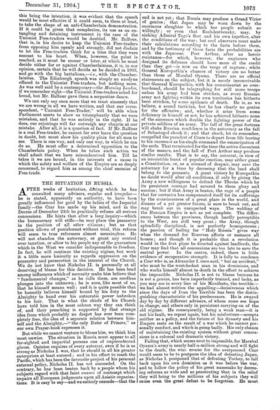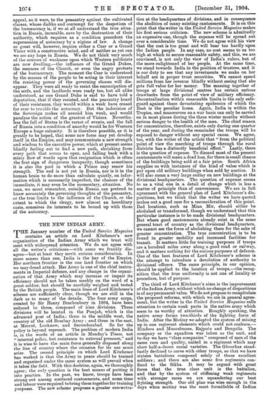A FTER weeks of hesitation, diking which he has consulted many
advisers, regular and irregular— he is stated, apparently on authority, to have been greatly influenced for good by the ladies of the Imperial family—the Czar has made up his mind, and in the Decree of December 24th he practically refuses all serious concessions. He hints that after a long inquiry—which the bureaucracy will stifle—he may place the peasantry in the position of all other citizens ; but as that position allows of punishment without trial, this reform will seem to true reformers almost meaningless. He will not abandon the autocracy, or grant any control over taxation, or allow to his people any of the guarantees which in. the West we consider indispensable to freedom. In fact, he will continue the existing regime, but work it a little more leniently as regards oppression on the peasantry and persecution in the interest of the Church. We do not know that Nicholas II. is personally at all deserving of blame for this decision. He has been bred among influences which of necessity make him believe that "fundamental changes," as he calls them, are needless plunges into the unknown; he is sure, like most of us, that he himself means well ; and it is quite possible that he honestly believes himself bound by his duty to the Almighty to hand over his autocratic power unbroken to his heir. That is what the chiefs of his Church have told him in the most solemn way they can think of, and their preaching is supported by that strange idea from which probably no despot has ever been com- pletely free, the idea of a separate relation between him- self and the Almighty,—" the only Ruler of Princes," as our own Prayer-book expresses it. But while we cannot venture to blame him, we think him most unwise. The situation in Russia must appear to all far-sighted and impartial persons one of unprecedented gloom. Opinion requires of every autocrat, even if he is as strong as Nicholas I. was, that be should in all his greater enterprises at least succeed ; and in his effort to reach the Pacific, which has been the favourite project of his personal external policy, Nicholas II. has not succeeded. On the contrary, he has been beaten back by a people whom his subjects regard with that faint nuance of contempt which impairs all European judgments upon all Asiatic organisa- tions. It is easy to say—and we entirely concede—that the end is not yet ; that Russia may produce a Grand Vizier of genius ; that Japan may be worn down by the enormous slaughter to which her people submit so willingly; or even that Rozhdestvensky, may, by sinking Admiral Togo's fleet and his own together, alter the conditions of the war; but cool observers must make their calculations according to the facts before them, and by the testimony of those facts the probabilities are with the Japanese. Port Arthur, after an heroic resistance—for which, however, the engineers who designed its defences should have more of the credit than they get—is now on the verge of capture ; while General Kuropatkin's chances of victory are no better than those of Marshal Oyama. There are no official statements on the subject, but it is nearly inconceivable that General Kuropatkin, with his commissariat so over- burdened, should be telegraphing for still more troops unless his army had been stricken, as every Russian army not fighting within its own territories has hitherto been stricken, by some epidemic of death. He is, as we believe, a sound tactician, but he has clearly no genius for the offensive ; and, whether it arise from some deficiency in himself or not, he has achieved hitherto none of the successes which double the fighting power of the private soldiers of an army. The fall of the great fortress will shake Russian confidence in the autocracy as the fall of Sebastopol shook it ; and that shock, let us remember, compelled the proudest of Czars to depart from life leaving to his successor as his single command the emancipation of the serfs. That terminated for the time the active discontent of the masses, and the fall of Port Arthur may produce similar results. That is to say, the autocrat, in view of an irresistible burst of popular emotion, may either grant a Constitution, or, as a counsel of despair, may save the autocracy for a time by decreeing that the laud shall belong to the peasants. A great victory by Kuropatkin no doubt would alter all conditions, if only by giving the Army a new willingness to defend the Throne which by its persistent courage had secured to them glory and success ; but if that Army is beaten, the rage of a people that for centuries has compensated itself for its sufferings by the consciousness of a great place in the world, and dreams of a yet greater future, is sure to break out, and may break out in unexpected ways. The welding of the Russian Empire is not as yet complete. The differ- ences between the provinces, though hardly perceptible to the West, are still very great ; the Army, though splendidly disciplined, is not perfectly homogeneous ; the passion of feeling for "Holy Russia" gives way when the demand for Reserves affects or menaces all homes ; and though it is probable that a revolution would in the first place be directed against landlords, the Czar may find that all concessions are too late to save the central power. In the centre, indeed, there is little evidence of recuperative strength. It is folly to condemn a Czar who is, as Alexander I. once said," but an accident," who must be the wretchedest man in his dominions, and who works himself almost to death in the effort to achieve the impossible. Nicholas II. is not to blame because he is not a genius, has been imperfectly trained, and lacks, as you may see in every line of his Manifesto, the terrible— we had almost written the appalling—decisiveness which since the days of Ivan the Terrible has been the distin- guishing characteristic of his predecessors. He is swayed day by day by different advisers, of whom some see hope in change, and others only in persistent carrying on of the old regime. He consequently, being a weak man—it is not his fault, we repeat again, but his misfortune—accepts neither as a policy, and the future of his dynasty and his Empire rests on the result of a war which he cannot per- sonally conduct, and which is going badly. His only chance of maintaining the existing system without great conces- sions is a colossal and dramatic victory.
Failing that, which seems next to impossible, for Marshal Oyama's army is nearly half-a-million strong and will fight to the death, the wise course for the overpressed Czar would seem to be to postpone the idea of defeating Japan, as Nicholas I. postponed that of defeating Turkey, to fall back upon his own dominion as it was before the war, and to follow the policy of his great namesake by decree- ing reforms so wide and so penetrating that in the relief they will bring to the millions of his subjects they will cause even the great defeat to be forgotten. He must appeal, as it were, to the peasantry against the cultivated classes, whose dislike and contempt for the despotism of the bureaucracy is, if we at all understand the true situa- tion in Russia, incurable, save by the destruction of their authority, which requires as a condition precedent the supersession of autocracy by a regime of law. A change so great will, however, require either a Czar or a Grand Vizier with a constructive mind, and of neither as yet can we see any hope in Russia. We do not think very much of the sources of weakness upon which Western publicists are now dwelling,—the influence of the Grand Dukes, the menaces of the Church, or even the angry protests• of the bureaucracy. The moment the Czar is understood by the masses of the people to be acting in their interest the resisting power of the governing classes will dis- appear. They were all ready to resist the emancipation of the serfs, and the landlords were ready too, but all alike understood, as one Grand Duke is said to have told a deputation, that if they resisted, and the peasantry heard of their resistance, they would within a week have ceased for ever to trouble the autocracy. But the indecision of the Sovereign makes all around him weak, and would paralyse the action of the greatest of Viziers. Neverthe- less the fall of States is the rarest of events, and the fall of Russia into a condition of anarchy would be for Western Europe a huge calamity. It is therefore possible, as it is greatly to be hoped, that some new force may yet develop itself in the Empire, and may communicate a new strength and wisdom to the executive power, which at present seems blindly feeling out to find a new path, shrinking from every path that seems to open, and falling back with a misty flow of words upon that resignation which is often the first sign of dangerous incapacity, though sometimes it is also the pool in which a Prince may renew his strength. The end is not yet in Russia, nor is it in the human brain to do more than calculate quietly, on infor- mation which is necessarily imperfect, the chances of the immediate, it may even be the momentary, situation. No man, we must remember, outside Russia can pretend to know accurately the governing thoughts of the peasantry, or the true limits to the influence of the Church, or the extent to which the clergy, now almost an hereditary caste, conceives its interests to be bound up with those of the autocracy.



































 Previous page
Previous page